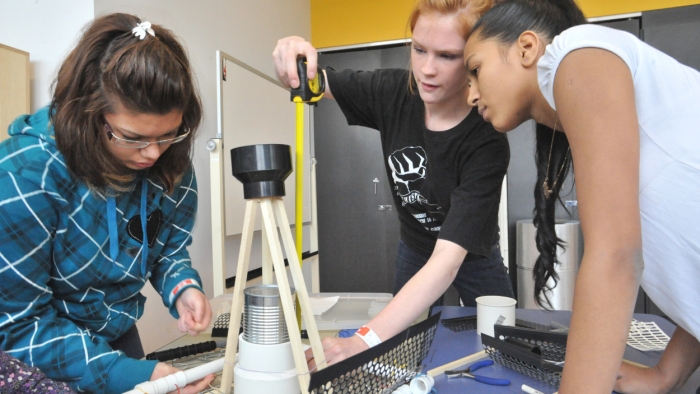Feb. 11 was the United Nations International Day of Women and Girls in Science, and to celebrate the occasion, the Montreal Science Centre hosted Women & Science, an event designed to encourage young women and girls to pursue careers in science and technology.
Even in 2018, there is a prevalent gender gap in science, technology, engineering, and mathematics (STEM) education. According to UNESCO, only 35 per cent of STEM students in higher education internationally are female, and only 28 per cent of the world’s researchers are women.
Women & Science is a part of the mission to close this gap. Girls under the age of 18 were granted free admission to the Indigenous Ingenuity exhibit—a showcase of Indigenous science and technology—as well as permanent exhibitions that allowed them to explore everything from the human body to novel inventions and machines. The Montreal Science Centre, with its colourful floors and informative, interactive activities, was bustling with children of all ages.
An activity room with interactive scientific presentations and workshops allowed children to practice their coding skills with Kids Code Jeunesse, a non-profit organization with a mandate to teach Canadian children how to code. Falcon Ed, a company specializing in training birds of prey for conservation or ecological purposes, educated a fascinated audience on the biodiversity of these birds, with species such as the American kestrel and great horned owl present.
Numerous organizations were in attendance, including video game publisher Ubisoft, artificial intelligence solutions provider Element AI, Environment and Climate Change Canada, and science communications group L’Association des communicateurs scientifiques du Québec.
Marie-Pierre Carbonneau works at Concertation Montreal on a project called Mouvement Montréalais Les Filles & le code, which encourages young girls from ages 12 to 17 to become interested in tech. She highlighted Ma Carrière Techno and Ma Vie Techno, two websites that aim to educate and assist women in finding technology-related careers.
“[The goal of Ma Carrière Techno] is to know more about different careers in technology so that people can go on the website and see, ‘OK, if I want to be a webmaster, what does that mean?’” Carbonneau said in an interview with The McGill Tribune.
Essentially, the website serves as a tool for exploring careers and the skills they require. Ma Vie Techno is a resource for finding opportunities with organizations and activities related to technology.
“We are here because we know that we need lots of girls in science and technology, and sometimes girls say ‘Oh, technology, it’s not for me!’” Carbonneau said. “But yes, it’s for you, and we need you.”
Amira Bencherif, from Université de Montréal’s Institute for Research in Immunology and Cancer, works in a multidisciplinary lab with a team of students of varying educational backgrounds, including physics, engineering, and biology. The lab’s goal is to detect cancers at early stages and at a faster rate than would be possible in a large laboratory.
“We make electronics to […] detect mutations in DNA,” Bencherif said. “The idea is that […] to detect cancers, to detect illnesses, we’re trying to make [the technologies] smaller.”
The Canadian Space Agency (CSA), which works with Earth-observation satellites, space robotics, space exploration, and satellite technologies, was also present. The CSA operates satellites for the Canadian government that have multiple applications, from predicting natural disasters to tracking environmental damage like oil spills.
Marie-Josée Potvin, a structural engineer with the CSA, stressed the importance of teamwork, passion, and hard work in science, but said that she often sees a lack of self-confidence in young girls.
“I would say if it’s a passion, […] just go for it, and keep working hard,” Potvin said. “Everyone’s starting at the same level. No one’s born knowing science. You learn about it.”
She added that any field of science has an impact on humanity, and that women should not be discouraged from participating: They just have to be ready to work hard.
“You’re helping people adapt to this planet and live better, so this is very important work,” Potvin said.
Women & Science served as an opportunity for women and girls to gain exposure to a diversity of careers available in STEM. As more women get involved in fields that have been historically dominated by men, the overall knowledge of that field expands. Breakthroughs cannot continue to occur if we refuse to break barriers.
A previous version of this article incorrectly stated that Marie-Pierre Carbonneau works at CGI in Information Technology.
In fact, Carbonneau is an employee at Concertation Montreal.
The Tribune regrets this error.








